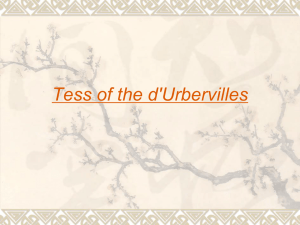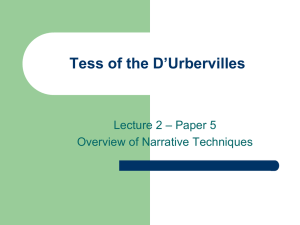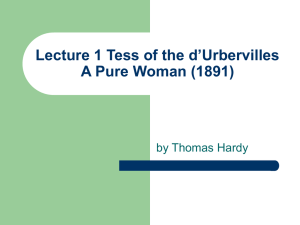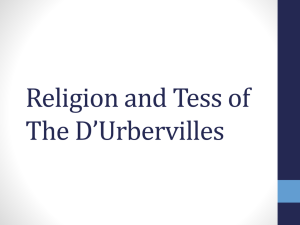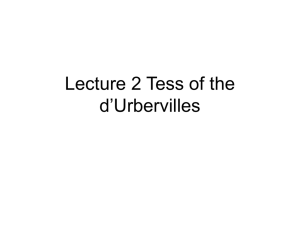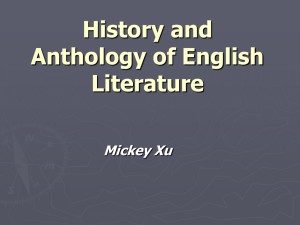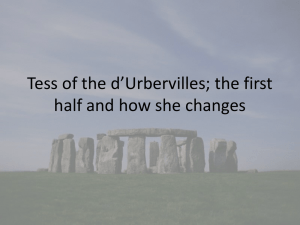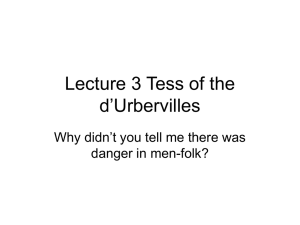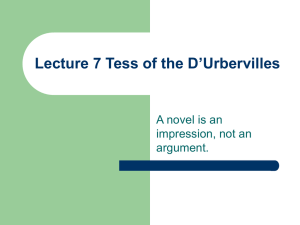Tess of the D`Urbervilles
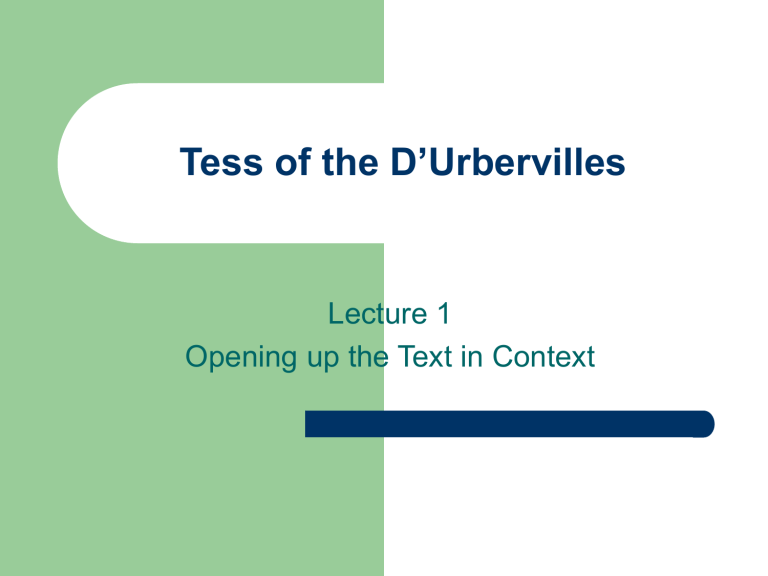
Tess of the D’Urbervilles
Lecture 1
Opening up the Text in Context
A Very Brief Synopsis …
Tess Durbeyfield, a poor country girl, is raped (?) and made pregnant by Alec D’Urberville.
The baby (christened Sorrow) dies and Tess goes to work on a dairy farm, where she meets and falls in love with Angel Clare.
On their wedding night, when Tess confesses to
Angel about her past, he rejects her and goes off to Brazil.
Tess meets Alec again and for a variety of reasons, including the fact that he has persuaded her that Angel will never return, she agrees to live with him.
However, Angel does return and Tess, furious that
Alec had lied to her, murders him.
Tess experiences a week of bliss with Angel, but at the end of the novel, she is arrested at
Stonehenge and subsequently hanged.
Socio-historical Context –
The Woman Question in19
th
C. England
Impact of Industrialization
Cultural re-visioning of the Victorian middleclass image of women
Denied of any real political & economic power
Widening gulf btwn the middle-class & working-class women (exploited outside the home in dehumanizing factories)
Separation of spheres for women & men
Men identified with the external, public world of work and women with the internal, private world of feeling
An ideology that protects the idealization of the middle-class notion of home and family as a moral & spiritual refuge
Women idealized as custodians of the moral conscience, the repository of all virtue
Fear that the blurred distinction btwn the public / private would coarsen women’s superior moral nature
Controlled image of the woman as wife & mother
Policing female sexuality
Double standard in sexual morality – where men could and did resort to prostitutes / mistresses, middle-class women who were more liberal in their sexual attitudes & behaviour were regarded as
‘fallen’
Women denied of any sexual feelings, and were doubly victims of idealization and abuse
Late 19 th C. (1880s-90s) – beginnings of a major revision in thinking about women & their status
Perception that the ‘woman question’ had arrived with the popular phrase ‘the new woman’ coined in the 1890s to describe women who had either won or were fighting for equality & personal freedom
Literary Context - Publication
TUB appeared in weekly instalments in the
Graphic from 4 July – 26 Dec 1891 (late
Victorian / early modern?)
In serializing the novel, Hardy had to rework his original manuscript for the serial market, due to Victorian moral sensitivity over the treatment of female violation, illegitimate birth
& sexual hypocrisy
First edited, serialized version was published as a book in Dec 1891
Added the (defiant?) subtitle ‘A Pure Woman
Faithfully Presented by Thomas Hardy’
For all the controversy sparked by the novel, the phenomenal sale of TUB actually gave
Hardy the financial security to concentrate on poetry
Literature & social change
The novel as a social critique on sexual politics
How far does TUB complicate / interrogate / disturb the Victorian ideals of womanhood and sexuality?
Gemma Arterton
(as Tess)
BBC
Adaptation of
Tess (2008)
Eddie Redmayne
(as Angle Clare)
Hans Matheson
(as Alec d’Urberville)
Woman as Victim
Tess as tragic heroine
Vital to engage with the complex construction of her victimization in the novel
A fictional char. who defies strict categorization as virgin or whore
“Nothing is more remarkable in the novel than the extraordinary passion with which Tess is described and justified.” (Biographer, Michael Millgate – 1971)
Victim of her own physical charms? Her sexual nature a tragic flaw?
Hardy emphasizes the beauty and sexual attractiveness of Tess – “pouted-up deep red mouth”, “flexuous and finely drawn figure”
It is her sexual attractiveness that invites the predatory advances of Alec
But note ambiguity in the scene at The Chase in
Chap 11 - seduction or rape?
A victim of her own high moral standards?
Consider Joan Durbeyfield’s outburst at Tess’s trusting decision to tell Angel about her past with
Alec “O you little fool – you little fool!”
Tess’s scrupulous conscience that unfortunately deprives her of the instinct to survive, resulting in the suffering of a genuinely moral woman
A victim of injustice caused by the conflict btwn spontaneous morality and a distorted patriarchal value-system on sexual morality?
More sinned against than sinning – Tess acts for the best but the worst befalls her due to circumstances beyond her control?
Angel’s crude application to Tess of the Victorian double standard of sexual morality which excuses his own past as ‘wild oats’ while condemning his wife
– “the woman I have been loving is not you” (Chap
35, p.229)
Exposes the inflexible demand for purity that reduces Tess to terrible poverty, driving her back to
Alec and eventually to murder and hanging
Yet, isn’t Tess also a victim of her own passivity that perhaps results from an all-too effective conditioning as a woman?
Tess’s acceptance of Angel’s judgment of her, even though her instincts tell her he is unjust and hypocritical
She seems to have embraced the ideology of purity and is left defenceless because of it
Complexity of Tess’s victimization – is the source of the tragedy within and/or outside of her?
A victim only of her sexuality? How about class & family?
More significantly, the force of the novel stems from the ways Hardy conveys his intense sympathy for her.
Significance of voice & perspective
Voice & Perspective
Complex use of point of view
Third-person omniscient narrator that can present events / situations through the eyes of different characters (i.e. multiple perspectives)
Hardy (as author) not necessarily the narrator, though we can ‘hear’ his intrusive voice
“Darkness and silence ruled everywhere around. Above them rose the primeval yews and oaks of the Chase, in which were poised gentle roosting birds in their last nap; and around them the hopping rabbits and hares.
But where was Tess’s guardian angel? where was Providence?” (Chap 11, p.74)
How do we as readers respond to this strength of feeling? – involved & moving or too heavily insistent, even contrived?
Does this undercurrent of emotion conveyed by a significantly male voice complicate or perhaps even compromise Hardy’s social criticism of women’s issues?
Forcefulness of sympathy for Tess’s plight is double-edged.
At one level, such forcefulness exposes the hypocrisy of Victorian sexual norms and its cruel injustice inflicted on women (in his time).
Yet, at another level, some feminist critics have suggested that Hardy, in his fascination with Tess, is creating an ideal subjected to the voyeuristic male gaze.
Contradictory positioning of Hardy as a writer in presenting women and their experiences
Hardy still sees Tess’s self-effacing character
(her meekness as patience) as good and admirable, which paradoxically endorses a moral pattern of womanhood which the novel demonstrates is damaging and repressive
Hardy is sympathetic to women’s dilemmas and demands, but this sympathy is still embedded in a culture which was still essentially patriarchal
Fictional stereotypes of women remodelled, but not transformed
Is this contradiction also found in Lawrence’s
WL ?


